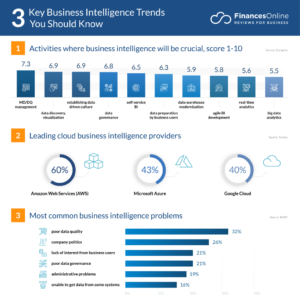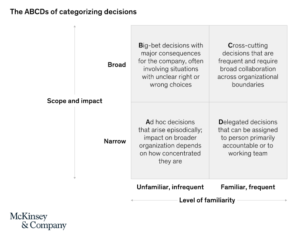3 Key Reasons Why You Should Use Business Intelligence in Your Organization
The only constant in today’s business environment is change – and you’ll need to make vital decisions that affect your company almost every day. Making informed decisions about your business can help you excel beyond your competitors, and it’s for this reason you should use business intelligence (BI) tools and strategies when proposing changes in your organization.
McKinsey notes that while technologies have helped shape how businesses operate over the last decade, the same cannot be said for making data-driven strategic decisions in most organizations. In fact, early adopters of data-driven decision-making strategies are three times more likely to attribute increased earnings of up to 20% to the use of analytics-based insights.
It’s not enough to base crucial decisions about your business strategies on ad hoc initiatives or one-off actions. An evolving business environment requires a long-term strategic plan that aims to build resilient and sustainable organizations. In today’s blog, we’ll discuss why using business intelligence when making strategic decisions about your organization is the best way to uncover new opportunities, improve current operations, and leverage data to empower your employees.
Why Use Business Intelligence for Data-Driven Decision-Making
Having access to robust data architecture enables your organization to collect, analyze, and share information rapidly with different teams for improved task execution. It also provides you with actionable insights about your current performance that can drive strategic initiatives throughout the organization.
You can use BI to overcome cultural resistance to change and avoid having to resort to internal evangelism whenever a new decision affects frontline employees. BI enables you to make the process of data-driven decision-making a tangible reality in your business.
Actionable insights from BI include making major decisions about technology adoption, supply chain management, pricing decisions, and the current value realization from your digital ecosystems. Early adopters of the latest BI strategies aren’t replacing strategy development entirely, but rather using these insights to make bold choices about the future of the business.
To unlock the value of their data, enterprises should:
- Include a data leader as part of the C-suite team
- Make data accessible to frontline employees whenever needed
- Build an organizational culture that supports rapid testing and iteration while tolerating fast failure
- Include data proficiency in the hiring criteria for all new resources
Of these strategies, the education of all resources in data and analytics remains one of the key challenges for most organizations. Below, we’ll discuss three key reasons why using BI to make data-driven decisions in your business is vital for future sustainability and continued growth.
1. Uncover New Opportunities with Early-Stage Trends
From a strategic perspective, backing a viable technology during the early stages of development can determine the future success of your business. BI and analytics don’t just inform you about the latest consumer sentiments –they’re also a way to keep track of macro-developments in the market.
Building dashboards that provide real-time insight about market indicators can help you rank different technologies, products, and emerging role-players in your industry. By acting on these insights sooner than your competitors, you can remain ahead of the adoption curve and secure your share of the market. Trends may uncover new opportunities or help you identify any shortcomings in your current technology stacks early, allowing you to act before it’s too late.
2. Eliminate Bias from Strategic Business Decisions
Even in the most controlled environments, personal biases or the fallacy of the inside view can lead to underestimating certain factors when making plans for the future. Basing strategies on actual data helps organizations to take an outside view, instead of falling prey to cognitive biases developed over years of personal experience. Combining personal intuition with actual analytics about the reference case at hand will ensure you don’t make overly optimistic decisions that could damage the business.
Taking the outside view is possible in four steps:
- Sample – For each reference case, you should gather the latest data and request input from industry leaders and authorities outside your own business wherever possible.
- Analyze – Use this data to measure the outcomes (both successes and failures) of previous decisions to note the averages and extremes from the effects.
- Adjust – Once you calculate the statistical outcomes, adjust your planning according to the data instead of your own intuitions.
- Iterate – Generate new business intelligence by aggregating the data from your current initiatives and pivoting your approach wherever your strategy is falling short of the statistical analysis.
3. Empower Your Frontline Employees with BI and Analytics
One element where you can immediately harness the value of BI and analytics is to empower your frontline employees to make better decisions every day. In areas like sales and marketing where consumer sentiments play a vital role in success, BI can use real-time data from everyone to adjust your strategies accordingly.
Employees can use data to resolve complex problems quickly and allow you to adopt a management style that’s supportive instead of dogmatic. When employees base their decisions on insights generated from your BI implementation, your teams become agile and can respond to challenges effectively without requiring executive sign-off.
This releases your management team from dealing with everyday issues and allows them to take a strategic role in the organization, without compromising operations. Management can maintain broad responsibility for a team’s performance while delegating narrow decisions to frontline employees.
Use BI and Real-Time Analytics to Drive Your Organizational Growth with Rainmaker
As a Salesforce services and industry solutions expert, Rainmaker helps organizations to leverage analytics and BI for better business decisions. Our team works with your organization to analyze industry trends, develop innovative solutions, and implement clear strategies to drive growth using your business data.
To see how Rainmaker can assist your organization with data-driven decision-making, get in touch today.








